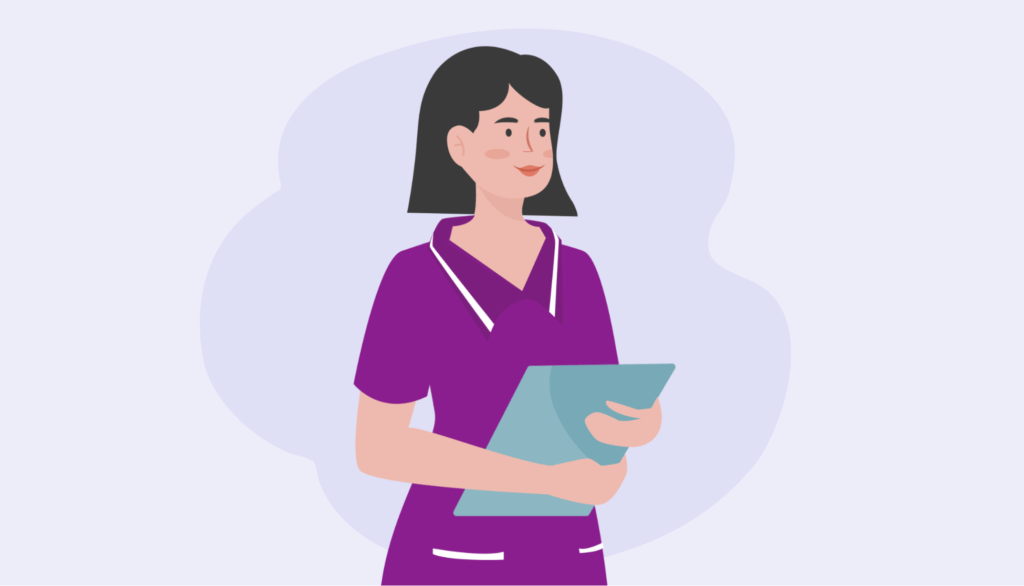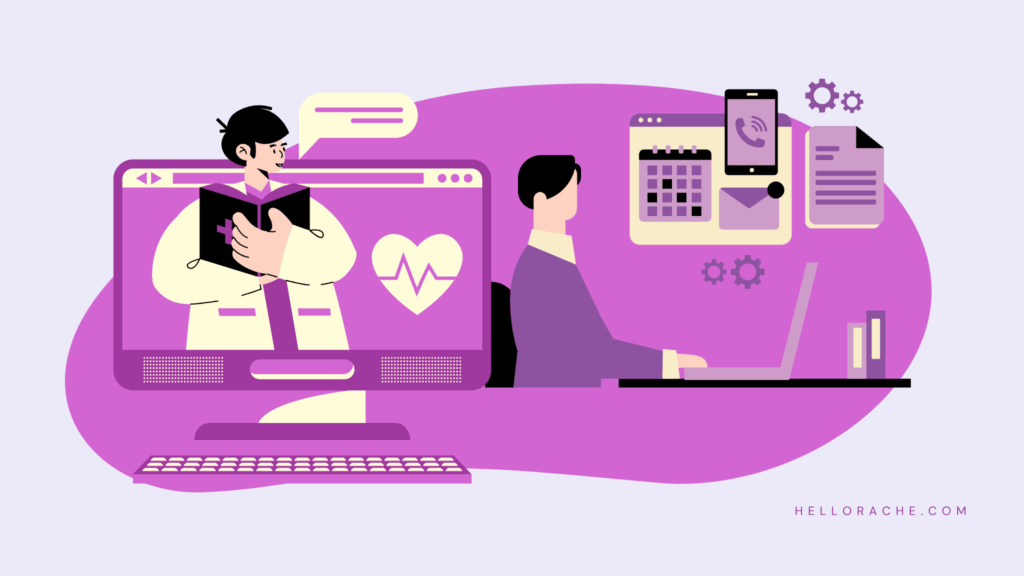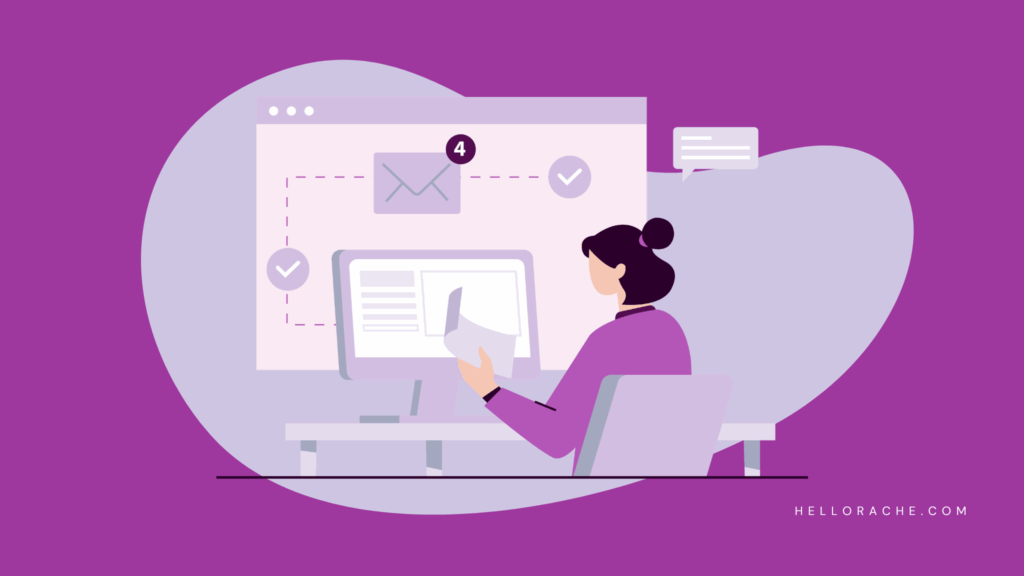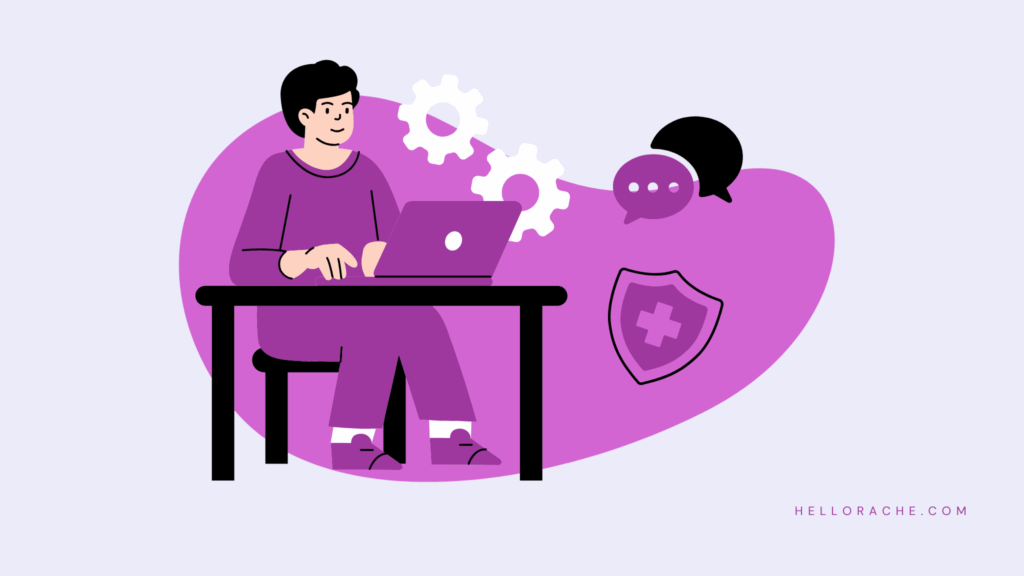Clinic assistants help medical professionals and their healthcare teams. They work in a range of settings, including public health clinics, outpatient services, and other medical organizations.
Thinking about hiring a clinic assistant? If the answer is yes, there are a few things you should consider first.
These workers can support you with a range of clerical and medical duties. However, hiring someone new does come with costs.
Before you decide, think about the kind of help you need. If you mainly need assistance with office tasks, a Healthcare Virtual Assistant is a cost-effective choice.
In this article, we’ll explain what a clinic assistant is, what their duties are, and the skills they need. We’ll also go through their average salaries and tell you why a virtual alternative could be the answer.
What is a clinic assistant?
Clinic assistants have a long list of essential job functions. Many of their daily tasks are administrative, such as updating records, answering phone calls, and performing data entry.
In some clinics, these medical staff members help with patient management. For example, they greet visitors, prepare patients for examinations, and perform basic diagnostic procedures.
Clinic assistants can be full-time or part-time employees. They can work standard office hours or weekends and night shifts in a hospital environment.
If you're looking for flexible clerical assistance, we have a solution. A Healthcare Virtual Assistant (HVA) from Hello Rache can give you support whenever you need it. There are no long-term contracts with an HVA or setup fees.
Our team members have healthcare experience and can help with anything from scheduling appointments to transcribing documents. Learn more about our HVAs and how they can free your staff to focus on more important tasks.
What does it take to be a clinic assistant?
If someone wants to be a clinic assistant, they'll need to tick a few boxes. For example, a high school diploma or equivalent is usually a requirement.
Most clinic assistants have an associate's degree in a relevant healthcare field. And in most states, they need clinic assistant certification.
A clinic assistant role involves office work and clerical duties, so frequent sitting may be expected. Healthcare experience and an understanding of medical terminology are also important.

Someone with technical skills, including computer skills, accurate typing, and confidence using office equipment, will give you the support you need.
Other skills to look for include verbal communication skills, organization, time management, and attention to detail.
The good news is our Healthcare Virtual Assistants have the right experience for the job. They can take care of all your paperwork, and as a result, you won't have to hire a new employee.
How much does a clinic assistant make?
The average salary for a clinic assistant can vary. For example, someone with over five years of experience will earn more than someone who's just starting. Your location can also impact how much you should pay these workers.
On average, clinic assistants in the US make $16.42 per hour. Those in the 10th percentile make around $12.34 per hour, while those in the 90th percentile make $22.15 per hour.
Then, there's experience. A clinic assistant with under five years of experience can make an average of $15.37 per hour. If you compare this to someone with more than five years but less than ten, the rate jumps to $16.87 per hour.
Here's a glimpse of clinic assistant rates around the country. In Minnesota, the average wage is $19.15 per hour. In Florida, it's below average at $14.45 an hour.
New York is one of the highest-paying states, with an average clinic assistant wage of $22.49 per hour.
No matter where you live, an HVA is a more affordable alternative. At Hello Rache, we offer a flat rate of just $9.50 per hour. You'll get the same quality service at a fraction of the cost.
A day in the life of a clinic assistant
What does a clinic assistant do?
To help you decide whether a clinic assistant is the right choice for your clinic, we've put together a list of their top 10 duties.
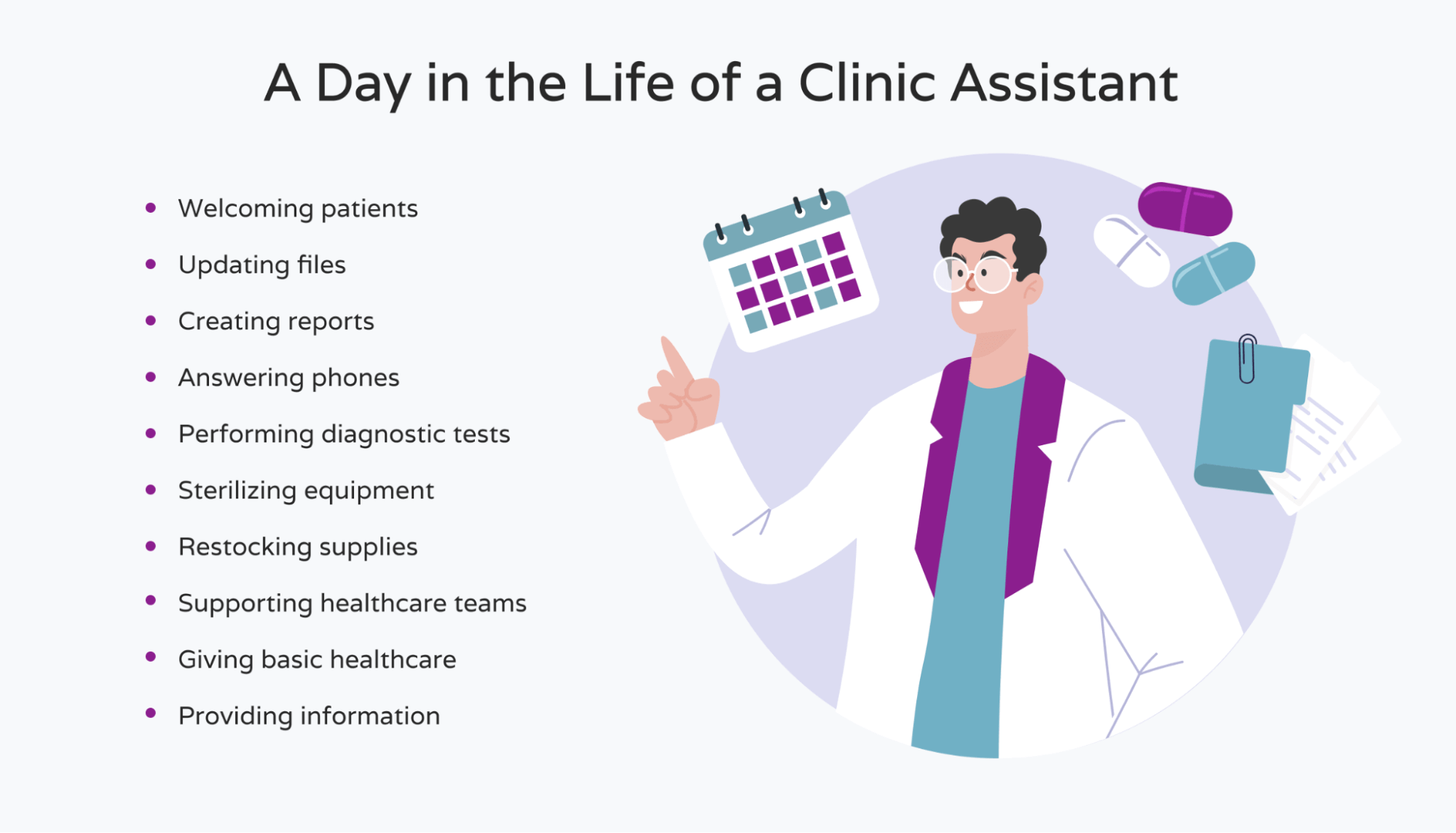
1. Welcoming patients
Medical clinics and hospitals can be busy environments. When patients arrive for their appointments, they may feel overwhelmed or distressed. Clinic assistants are there to greet them with a friendly smile.
These medical staff members check the patient's details and make sure their personal information is up to date. If the healthcare professional is running late, the clinic assistant will ask the patient to sit in the waiting room.
Clinic assistants can also get patients ready for procedures. For example, they can bring them hospital gowns and go through their medical histories.
If a patient has any questions, the clinic assistant can find the answers for them.
2. Updating files
Patient files and medical charts need to be accurate. If you don't maintain your records, errors can result — and any mistakes can be detrimental to your patients' health.
Whether it's electronic medical records or traditional paper files, an experienced clinic assistant can help. They can confirm the information with the patient and make changes as required.
For example, if a licensed physician prescribes a new medication, it needs to be added to the patient's medical records. A clinic assistant can perform this task.
Updating files is a common administrative task in healthcare clinics. Our HIPAA-trained Healthcare Virtual Assistants can handle medical documentation with confidentiality and efficiency.
3. Creating reports
Reporting plays a role in every healthcare facility, and it's part of a clinic assistant's job description.
For example, a clinic assistant may input data and prepare reports for management. If they're performing diagnostic tests, they'll need to update patient charts and create reports for the medical doctor.
Healthcare professionals often work collaboratively. Clinic assistants may sometimes be asked to prepare reports for other specialists, such as social workers, physiotherapists, or dieticians.
Additionally, insurance providers may need their reports collated.
Clinic assistants can help you prepare reports, but they're not the only ones. An HVA can use their medical knowledge and computer skills to take care of all your reporting needs.
4. Answering phones
Clinic assistants are responsible for answering phone calls. They use their interpersonal skills to introduce the healthcare provider and find out what the caller needs.
One of a clinic assistant's main duties is scheduling appointments. They try to find convenient times for patients to visit without double-booking. These medical staff members also check the doctor's availability before scheduling each appointment.
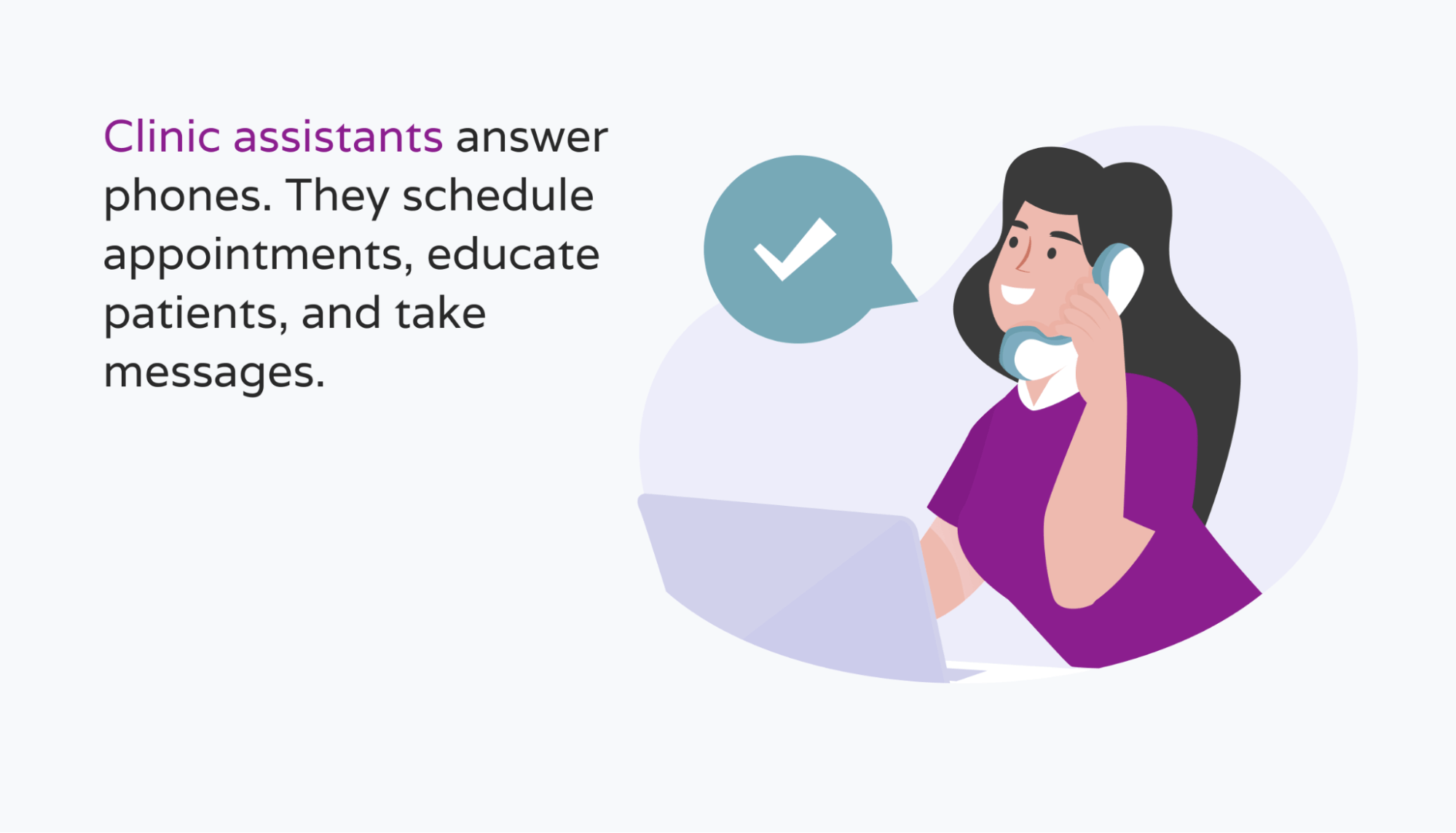
Basic patient registration can be done over the phone. For example, the patient can confirm their full name, date of birth, address, and phone number.
Clinic assistants screen calls and take messages.
If you're looking for someone to schedule clinic appointments with professionalism, an HVA can do the job. Plus, our team members can take messages and call patients to remind them of upcoming appointments.
5. Performing diagnostic tests
Patient examinations and tests can be stressful situations for patients. Clinic assistants need to be calm and compassionate.
Depending on the type of clinic services you offer, clinic assistants can perform basic diagnostic tests. With training, clinic assistants can check blood pressure and vital signs. They can also compile information about patients.
In some settings, they can also take x-rays and ready them for specialists. Plus, they can take blood tests and ask for urine samples to be sent for laboratory testing.
6. Sterilizing equipment
In a medical office environment, keeping the workspace clean is essential. This is something a clinic assistant can help you with.
These professional staff members can wash and sterilize equipment. They make sure any single-use items are disposed of correctly. Plus, they spray and wipe down benches, tables, and chairs.
If they're collecting a blood or urine sample, the clinic assistant makes sure the process is dealt with carefully — keeping hygiene in mind.
Clinic assistants can also do general tidying. For example, they can put magazines away in the waiting room and remove trash.
7. Restocking supplies
To keep your healthcare facility running smoothly, you'll need good supply management. A clinic assistant can keep track of inventory and reorder items as required.
When the new stock arrives, they can carefully unpack and distribute it and refill supplies that are low.
For example, there can be medical supplies. This includes items such as bandages, syringes, surgical masks, and gloves.
Then there are office supplies. This includes stationery, paper, and printer cartridges.
You may already have regular suppliers. Your clinic assistant can build relationships with them and get the best possible price for quality bulk goods.
8. Supporting healthcare teams
To provide quality healthcare, every member of your team should support each other.
Clinic assistants provide general help to doctors, nurses, and other specialists.
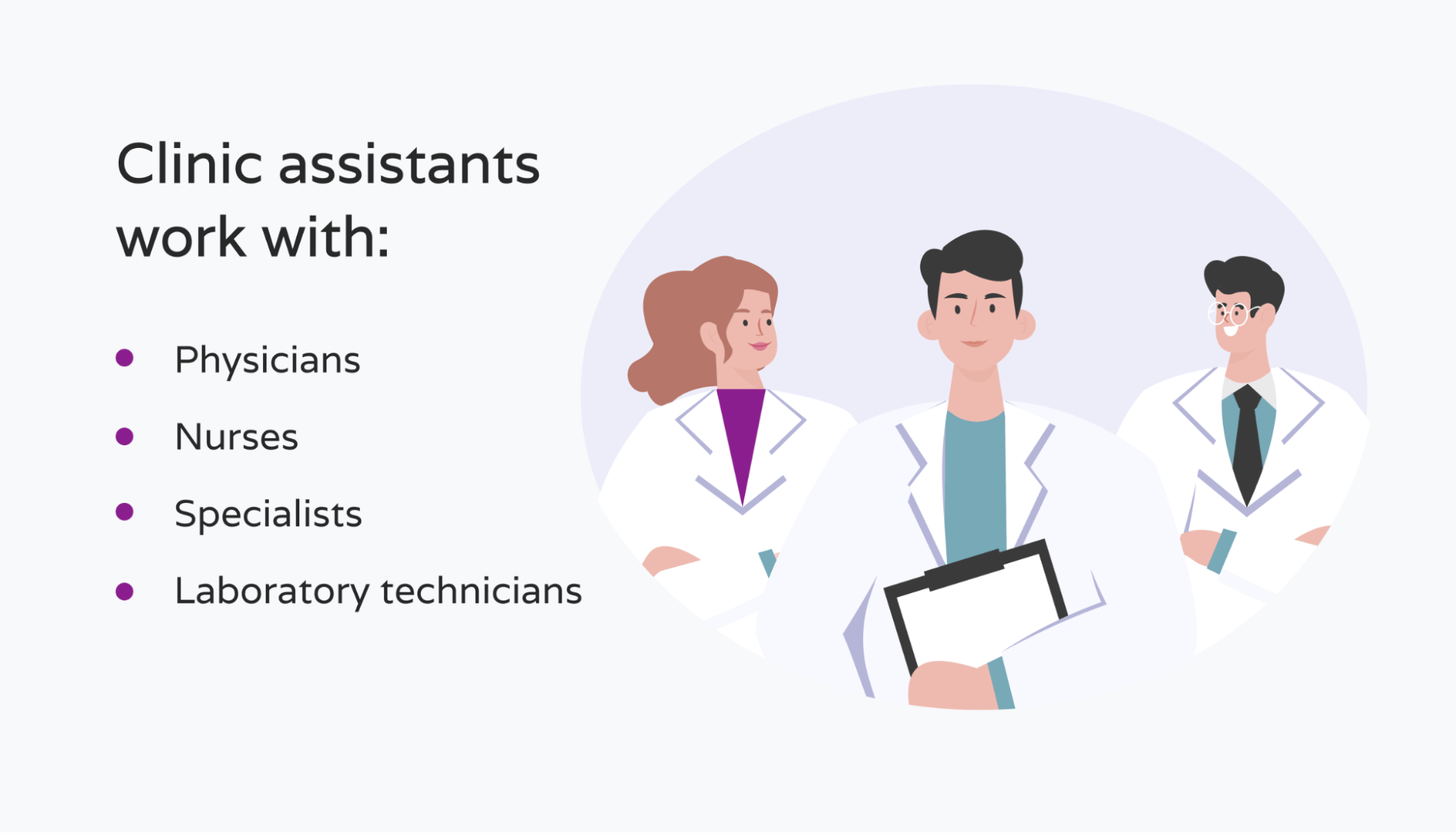
The types of professionals you work with will depend on the services you provide. For example, in a hospital, a healthcare team may also include laboratory technicians, nurse practitioners, physician assistants, and social workers.
From coordinating meetings between staff to completing clerical tasks, the right clinic assistant will do it for you.
Remember, HVAs can support your team and fill any gaps. For example, if your medical office staff members are feeling overwhelmed by their workloads or a healthcare professional needs help with paperwork, an HVA can help.
9. Performing basic healthcare procedures
If you have a busy clinic, you may need help with basic healthcare procedures. Clinic assistants can do a variety of tasks.
While working under supervision, these certified medical staff members can immunize patients and update their vaccination records.
Clinic assistants can also provide basic wound care. If a patient is injured, they can assist the physician in cleaning and wrapping the wound.
They'll have first aid training and will know how to administer emergency resuscitation.
10. Providing information
Clinic assistants give patients information. They can act as a liaison between patients and healthcare providers, and they can answer any questions patients may have.
Clinic assistants might encounter language barriers occasionally. They should be patient during these situations and use their excellent communication skills to get through them.
Depending on the service, a clinic assistant can compile information packs for patients. These may include payment details and what the patient should expect on the day of their appointment.
The benefits of a virtual assistant
Now that you know more about the role of a clinic assistant, it's time to talk about remote alternatives.
If you're on the lookout for clerical support, a Healthcare Virtual Assistant from Hello Rache comes with a suite of benefits.
Here’s how.
We can save you money
Hiring a new employee is a long-term commitment. Advertising for staff can be costly, and you'll have to commit to an induction process. Besides their hourly salary, you'll need to think about overtime, health insurance, retirement benefits, and paid time off.
What if we told you there's help available for just $9.50 per hour? There's no catch, no overtime, and no commitments. Hello Rache's HVAs come at just a fraction of the cost of in-person staff members.
While we take care of your administrative tasks, you can focus on patient care.
We can save you time
Do you feel overwhelmed by the extra work you have to do between appointments? Is your paperwork piling up?
Hello Rache's HVAs can help you get back on track. They can reduce your workload and give you and your team a better work-life balance.
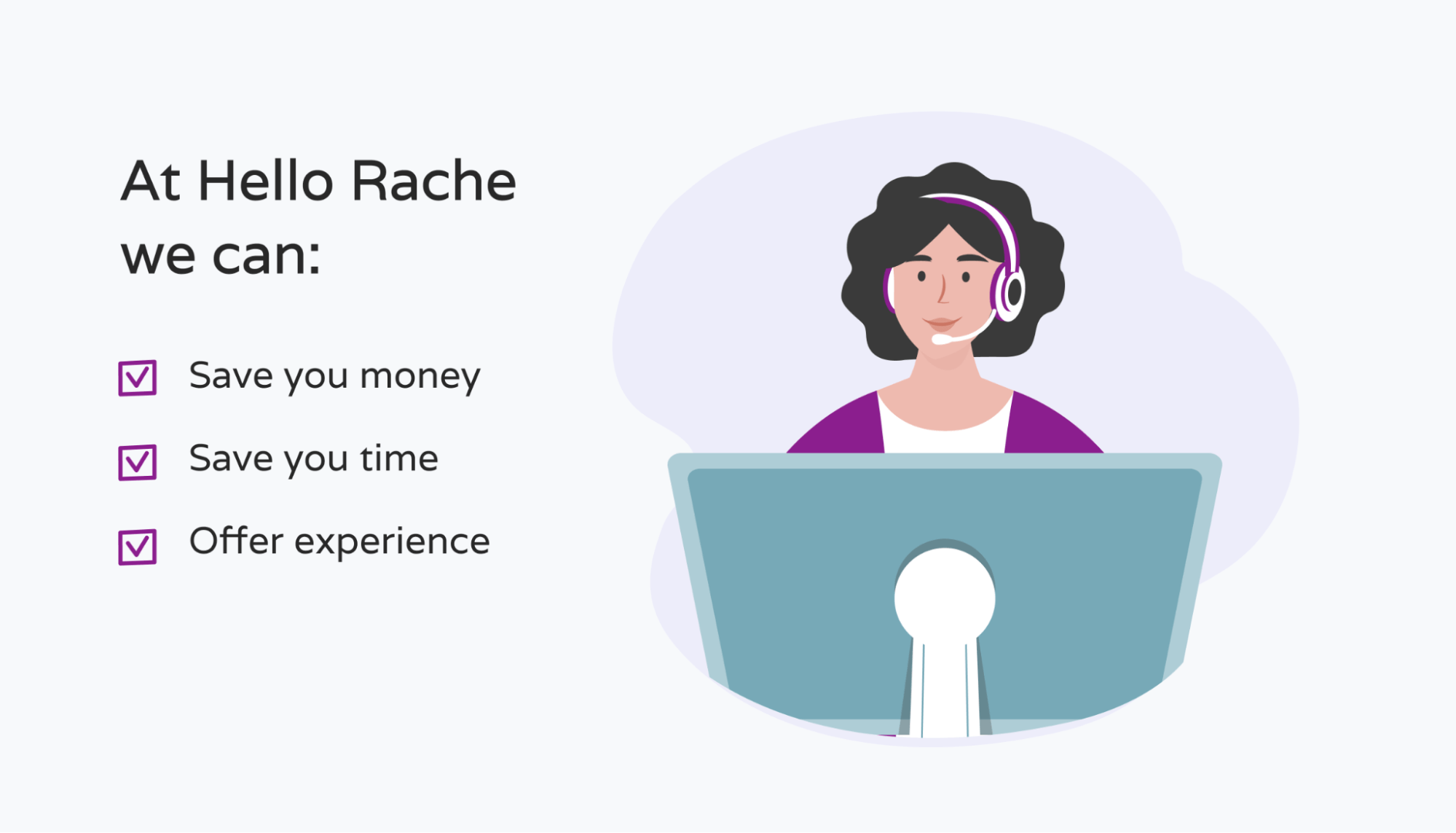
For example, HVAs can transcribe documents and update patient files. They can answer phone calls, input data, and create comprehensive reports.
With an HVA's flexible hours, you can get support during or after work hours and even on weekends. We work around your schedule.
We can give you experience
Our team members are HIPAA-trained and ready to work. Many of our HVAs have real-world healthcare experience — some have even worked as nurses or physician's assistants.
They understand basic physiology and anatomy and are confident in using complex medical terminology.
Because our team is used to working remotely, they can manage their time efficiently. They're tech-savvy and can navigate your preferred software with ease.
Rest assured that if you choose an HVA from Hello Rache, they'll fit seamlessly into your organization.
All about clinic assistants
Clinic assistants have a wide range of duties. They welcome patients, answer phones, provide information, update medical files, and create reports.
Trained clinic assistants can perform basic diagnostic tests, including blood tests and x-rays. Plus, they sterilize equipment, restock supplies, and support healthcare teams.
In some settings, they can provide basic healthcare, such as wound care and immunizations.
If you're looking for an alternative, HVAs can do many of these same tasks. Contact us today to learn more about our services.

